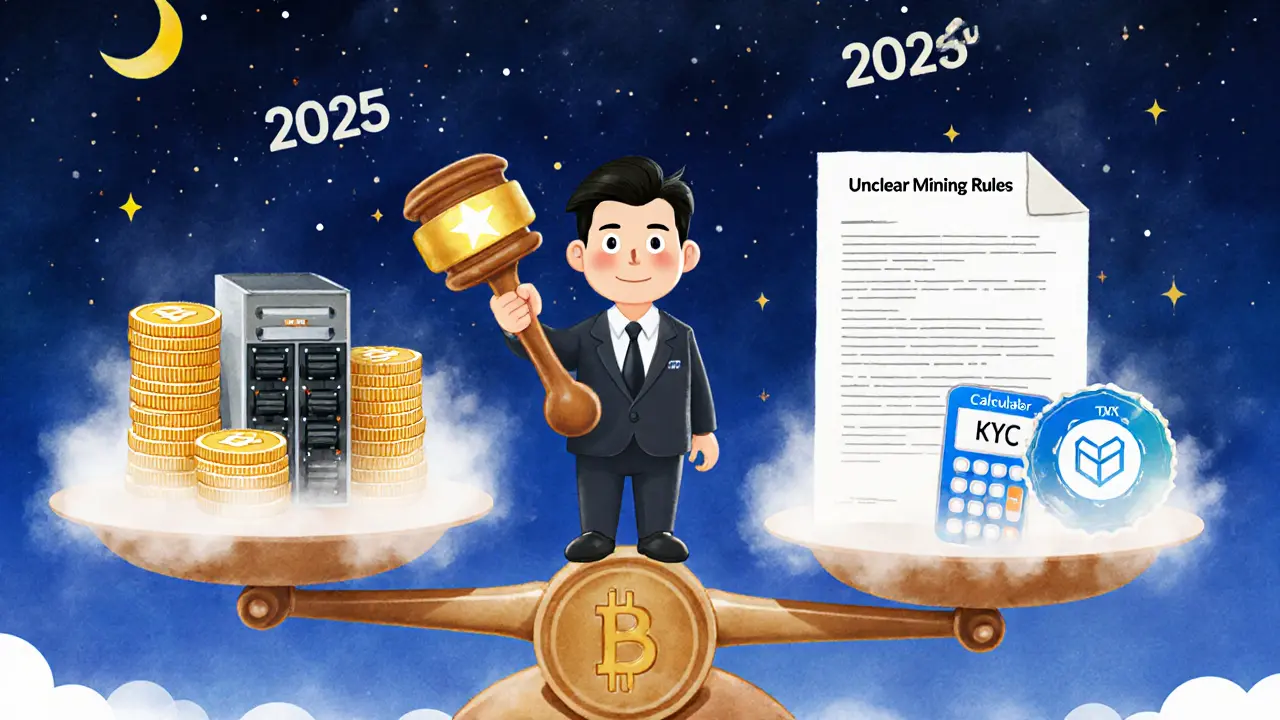 Nov, 16 2025
Nov, 16 2025
Vietnam Crypto Tax Calculator
How Vietnam's Crypto Tax Works
Under Vietnam's pilot program, crypto profits are taxed at 20% under securities tax rules. This rate may change as regulations develop. You must report all transactions and keep detailed records of your trades.
Tax Calculation Results
On September 9, 2025, Vietnam did something no other country has ever done: it launched the world’s first legal, government-run pilot program for cryptocurrencies - and it’s set to run until 2030. This isn’t a trial run with loose rules. It’s a full legal framework, written into national law, that turns crypto from a gray-area activity into something regulated, monitored, and officially recognized. If you’re trading, investing, or even just holding crypto in Vietnam, this changes everything.
What Exactly Is the Pilot Program?
The program is built on two official documents: Law No. 71/2025/QH15 on Digital Technology Industry and Resolution 05/2025/NQ-CP. Both were passed in mid-2025 and took full effect on January 1, 2026. The goal? To bring crypto out of the shadows and into a controlled environment where the government can watch, manage, and tax it - without banning it outright. Vietnam now officially recognizes virtual assets as legitimate property under its Civil Code. That’s huge. For the first time, owning Bitcoin, Ethereum, or any other digital token isn’t just tolerated - it’s protected by law. But there’s a catch: you can’t use them to buy coffee or pay bills. The State Bank of Vietnam still bans crypto as a payment method. You can’t use it like cash. But you can own it, trade it, and invest in it - if you follow the rules.Three Types of Digital Assets - One Clear System
The law doesn’t treat all digital assets the same. It splits them into three clear categories:- Virtual assets: Any digital item used for exchange or investment - like tokens, NFTs, or utility coins - as long as they’re not money or securities.
- Crypto assets: A subset of virtual assets that use encryption or digital tech to secure ownership and transfers - think Bitcoin and Ethereum.
- Other virtual assets: Anything else that doesn’t fit the first two - like game items or loyalty points that can be traded.
Who’s in Charge? The Ministry of Finance
The Ministry of Finance is the gatekeeper. No one can offer crypto services in Vietnam without their approval. That includes exchanges, wallet providers, and even staking platforms. The first licensed provider is expected to launch by March 2026. After that, Vietnamese users have six months to move all their trading activity onto these approved platforms. If you’re using Binance, KuCoin, or any offshore exchange right now, you’re already operating in violation of the new law - once licensing begins. You won’t get arrested overnight. But you could face fines, account freezes, or worse. The government has made it clear: after the grace period, only licensed platforms are legal.
Why Is Vietnam Doing This?
Vietnam isn’t trying to become the next crypto hub like Singapore or Switzerland. It’s trying to stop money from leaking out and keep control over its financial system. Before this law, Vietnamese traders were doing over $600 million in daily crypto transactions - mostly through offshore exchanges. That’s billions flowing out of the country, outside the banking system, untaxed, untracked. The government couldn’t stop it. So instead of fighting it, they decided to regulate it. This move also positions Vietnam as a tech leader in Southeast Asia. While China bans crypto completely and India taxes it heavily without clear rules, Vietnam is building a system that could attract foreign investment, tech talent, and blockchain startups. It’s a strategic play: let innovation happen - but only on our terms.What’s Still Unclear?
Even with a full legal framework, big gaps remain.- Taxes: There’s no official crypto tax rate yet. For now, the government is applying securities tax rules, which could mean 20% on profits. But that’s temporary. Final rules are coming.
- Mining: Is it legal? Nobody’s said. Miners are in limbo. No permits, no penalties - just silence.
- Penalties: What happens if you trade on an unlicensed platform? Administrative fine? Criminal charge? The law says violators face “administrative sanctions or criminal liability,” but doesn’t define thresholds.
- Foreigners: Can non-Vietnamese investors participate? Yes - but only if they use licensed Vietnamese platforms. No direct access to offshore exchanges.
What Does This Mean for You?
If you’re a Vietnamese citizen trading crypto:- Start preparing now. Find out which platforms are getting licensed. The Ministry of Finance will publish a public list.
- Don’t wait until the last minute. The six-month window after the first license is granted will be chaotic. Expect long wait times, technical issues, and limited support.
- Keep records. Every trade, every deposit, every withdrawal. You’ll need proof for taxes and compliance.
- Don’t use unlicensed platforms after March 2026. The risk isn’t just financial - it’s legal.
- Don’t assume you can serve Vietnamese users directly. You must partner with a licensed local provider.
- Expect strict KYC and AML checks. Vietnam’s standards are tighter than most Western countries.
- Watch for changes in 2027. The pilot is five years long, but the government may adjust rules based on early results.

How This Compares to Other Countries
| Country | Legal Status | Trading Allowed? | Taxation | Key Restriction |
|---|---|---|---|---|
| Vietnam | Legal under pilot (2025-2030) | Yes, only via licensed platforms | Temporary securities tax (20%) | No payments, no mining clarity |
| China | Banned | No | N/A | All crypto activities illegal |
| India | Legal but heavily taxed | Yes | 30% tax + 1% TDS | No clear licensing |
| Singapore | Legal, licensed | Yes | Capital gains tax applies | No ban on payments |
| United States | Legal, fragmented | Yes | Capital gains tax | State-by-state rules |
What’s Next? The Road to 2030
The next two years will be critical. By 2027, the government will have enough data to decide whether to extend the program, tighten rules, or even shut it down. Early signs point to success: over 80% of Vietnamese crypto traders say they support the move toward regulation, according to a VIR survey in early 2026. But challenges remain. Small traders are worried about fees and complexity. Startups fear they won’t be able to afford compliance costs. And without clear mining rules, Vietnam could lose out on blockchain infrastructure development. Still, the direction is clear. Vietnam isn’t trying to kill crypto. It’s trying to tame it. And if it works, this pilot could become the blueprint for other developing economies - especially in Asia - that want to benefit from digital assets without losing control.Is it legal to hold cryptocurrency in Vietnam after 2025?
Yes. Vietnam now legally recognizes cryptocurrency as a virtual asset under its Civil Code. You can own Bitcoin, Ethereum, and other digital tokens. But you cannot use them to pay for goods or services - that’s still banned.
Can I trade crypto on Binance or KuCoin in Vietnam?
After the first licensed platform launches (expected by March 2026), you have six months to move your trading to approved Vietnamese platforms. After that, using offshore exchanges like Binance or KuCoin for trading is illegal and could lead to fines or account freezes.
Will I be taxed on my crypto profits in Vietnam?
Yes, but the exact rate isn’t final yet. For now, the government is applying a 20% tax on crypto profits under securities rules. A dedicated crypto tax law is expected before 2027. Keep detailed records of all trades.
Is crypto mining allowed in Vietnam?
No official rule exists yet. Mining is in legal limbo. The government hasn’t banned it, but it hasn’t legalized or licensed it either. Don’t assume it’s safe - wait for official guidance, expected in 2026-2027.
What happens if I don’t comply with the new rules?
You could face administrative fines, account freezes, or even criminal liability depending on the severity. The law doesn’t specify exact penalties yet, but enforcement is expected to ramp up after the six-month transition period ends.
Can foreigners invest in Vietnam’s crypto market?
Yes - but only through licensed Vietnamese platforms. Foreign investors cannot directly access offshore exchanges to trade with Vietnamese users. All transactions must go through approved local providers under strict AML and KYC rules.
Rebecca Amy
November 16, 2025 AT 20:04lol at Vietnam thinking they can control crypto 😂
Aayansh Singh
November 18, 2025 AT 04:17This is the most naive regulatory experiment since the dot-com bubble. Vietnam doesn't understand blockchain - they just want to tax it. The moment they force KYC on every wallet, the entire market goes dark. You can't regulate what's decentralized by design. This isn't control, it's a death sentence for innovation. And don't get me started on that 20% tax - it's a confiscatory joke. Real crypto users will move to Thailand or UAE. Vietnam just became a cautionary tale.
Darren Jones
November 19, 2025 AT 11:36Actually, this is one of the most thoughtful approaches I've seen. Vietnam isn't banning crypto, they're not letting it run wild - they're creating a safe, legal space. The three-tiered asset classification? Brilliant. It separates speculation from utility. And the six-month grace period? That's user-friendly. Yes, there are gray areas (mining, final tax rates), but that's normal for any new framework. The key is: they're building infrastructure, not just imposing rules. If they stick to transparency and avoid overreach, this could actually work. Keep records, use licensed platforms, and you'll be fine. This is progress.
Kathleen Bauer
November 20, 2025 AT 16:03so like... if i hold btc in my wallet and dont trade, am i in trouble? 😅 just wanna know before i panic buy more lol
Carol Rice
November 21, 2025 AT 04:00YES! Finally! Someone gets it! Vietnam is not just regulating crypto-they’re reclaiming their financial sovereignty! Think about it: $600M DAILY leaking out? That’s a hemorrhage! Now they’re building a dam with rules, not a wall. This is leadership. No more offshore gambling. No more tax evasion. No more shadow economy. And guess what? It’s working-80% of traders support it! This isn’t a crackdown-it’s a correction. The haters? They’re just mad they can’t hide anymore. Wake up, people: the future is regulated, transparent, and accountable. Vietnam’s leading the charge!
Laura Lauwereins
November 21, 2025 AT 09:51so… they made crypto legal… but you can’t spend it? like… congrats? you’ve created the world’s most expensive digital collectible. 🤷♀️
Gaurang Kulkarni
November 22, 2025 AT 06:41Vietnam is a banana republic pretending to be Singapore. They think they can control technology with paperwork. The moment they force exchanges to report every transaction, the real users will move to P2P or Monero. This is theater. The government wants to look like they’re in control. But crypto doesn’t care about your laws. You can’t regulate what’s global. You can only drive it underground. And when that happens, the only ones getting fined are the small traders. The big players? They’ll just move offshore and laugh. This isn’t regulation. It’s a trap for the poor.
Nathan Ross
November 23, 2025 AT 23:48While Vietnam's approach is methodical, the absence of clear mining guidelines is a strategic oversight. Blockchain infrastructure is not merely speculative; it underpins consensus mechanisms and network security. By leaving mining in legal limbo, the state risks alienating developers and miners who could contribute to domestic digital sovereignty. Furthermore, the 20% securities tax may be misaligned with the nature of crypto as a decentralized asset class. A capital gains framework, calibrated to holding periods, would be more economically rational. The framework is commendable in intent, yet incomplete in execution.
garrett goggin
November 24, 2025 AT 16:53Let me guess: this is all a CIA front to track crypto users. The Ministry of Finance? More like the Ministry of Surveillance. They're using 'pilot program' as a euphemism for mass data harvesting. They know you're using Binance. They know your IP. They know your wallet addresses. And in 2027? They'll freeze your assets under 'national security'. This isn't regulation-it's a prelude to crypto confiscation. Remember 2020? They said 'taxes'... then came the crackdown. This is step one. Watch your back. Your Bitcoin is already flagged.
Bill Henry
November 26, 2025 AT 12:53imagine being so scared of crypto that you make a whole law just to watch people trade it 😭 i just wanna buy some dogecoin and chill